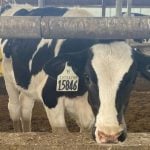Satisfying customers and reducing biodiversity loss, water consumption and greenhouse gas emissions are all top priorities for today’s alternative protein industry.
That’s what attendees heard during the “Feeding the Future with Alternative Proteins” online event hosted by Manitoba Agriculture May 23. Speakers delved into global trends in the sector and dissected experiences, challenges and opportunities within Manitoba.
The Food and Agriculture Organization of the United Nations predicts a significant increase in global demand for protein. Beef demand is expected to rise to 106 million tonnes by 2050 compared to 64 million tonnes in 2005. Poultry demand is expected to rise to 181 million tonnes from 82 million in that time, and egg demand is anticipated to jump to 102 million tonnes from 62 million.
Read Also

Farm Credit Canada forecasts higher farm costs for 2026
Canadian farmers should brace for higher costs in 2026, Farm Credit Canada warns, although there’s some bright financial news for cattle
Why it matters: The alternative protein industry faces complex issues such as rising global demand and the need for sustainability.
James Battershill is the founder of Winnipeg-based food processing company Juno Food Labs. Its products include Bump, a meat and plant protein blend, and it has stated goals toward sustainability and reducing the amount of resources used to create protein.
“We’re studying and evaluating and doing work that looks both at agriculture’s greenhouse gas emissions and contributions,” Battershill said. “We’re learning that it’s becoming more and more challenging to produce food in a way that’s sustainable, but also consistent and predictable.”
Volatile weather threatens production conditions. Coupled with growing global demand, it puts animal and plant protein producers in a tough spot.
“We expect over the next 25 years for (protein demand) to increase to the point where we’re potentially needing to double the amount of animal protein production over a 50-year period,” Battershill said.
He and event presenter Priera Panescu, lead scientist and plant-based specialist with the Good Food Institute, have joined forces with Stacy Prett, program manager of Proteins for Life at Wageningen University and Research in the Netherlands, to examine ways to use fewer resources during production to overcome climate challenges.
Battershill previously worked as a lobbyist and said he experienced first-hand the difficulties relating to social, economic and environmental issues. At the same time, he was inspired by innovations that emerged to solve problems.
“When I started my company five years ago, the plant-based meat sector was really starting to emerge. What got me really excited was the potential around precision fermentation, where we’re using yeast and microflora to produce true animal proteins,” he said.
Juno Food Labs aims to introduce consumers to novel protein technologies and take advantage of technological benefits to break down market barriers.
While many consumers in the alternative protein sector are vegan or vegetarian, the opportunity to reach meat-eating consumers led Battershill to focus exclusively on hybrid products.
The company is also trialing precision fermented alternative protein in combination with regular meats. It hopes to find new products that connect with non-vegetarian and non-vegan consumers.
There is pushback on that focus, Battershill said.
“We sort of were a bit dismissed first when people looked (at us) and said, ‘oh, is your product really necessary? You’re going to be obsolete in a couple of years when fully plant-based meat alternative protein achieves mass market adoption.’”
He and his colleagues disagreed. While there has been incredible growth in the plant protein industry in recent years, a new approach must be taken to move it forward, he said, especially since plant-based meat sales have dropped by about 32 per cent in the past five years.
That dip should be a clarion call for innovation in the sector to address product taste, cultural forces like religious and cultural preferences and sustainability, he said.
“All of these things have to be addressed and discussed in combination.”
At the Good Food Institute, a non-profit that focuses on sustainable, secure and fairly sourced protein, Panescu works on the three key areas of science and technology, corporate engagement and policy.
Market information from the U.S. National Consumer Panel shows opportunities to reach more households, attendees heard. It suggests the industry should focus on taste, price and health, the top motivators for American consumers.
There is room to improve taste, especially in the Canadian sector, Panescu said.
“There are so many wonderful crops that are being grown – many pulses that can do wonderful, wonderful things for functionality for these alternatives.”
People often forget the role of fat in alternative proteins, she added. Fats help make burgers juicier, milk creamier and cheese more delicious.
Much of the work on alternative protein fat lies in plant-based fermentation.
Different consumers in different countries have different reasons for choosing plant-based protein, Prett also noted. Those can include personal reasons, environmental health, food security and beliefs around animal well-being.
In Singapore, consumers are turning to alternative protein for food security reasons.
In Prett’s home country of the Netherlands, there’s a national protein strategy that includes cultivation of potatoes, grass and pulses, innovation in the alternative protein markets with microbial and cultured meat, use of insects for animal feed, upcycling residual streams and reducing meat consumption.















